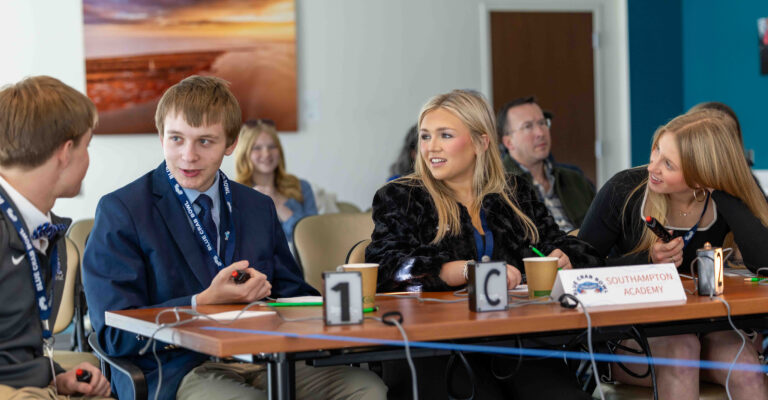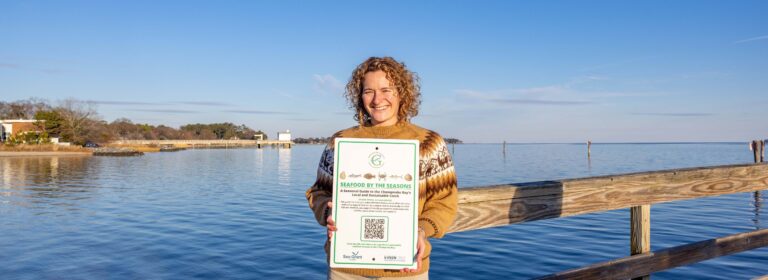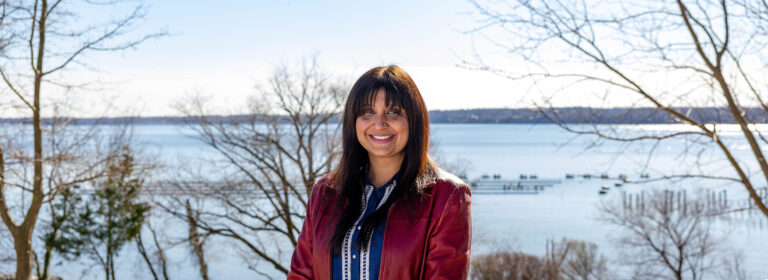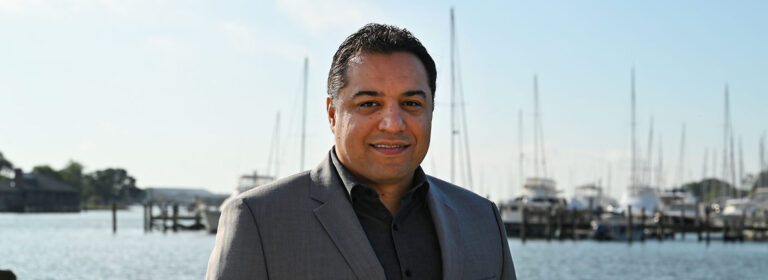Virginia Sea Grant partnership launches innovative living laboratory in Virginia’s Middle Peninsula.
Virginia Sea Grant launched the Coastal Resilience and Adaptation Ecosystem in collaboration with RISE Resilience Innovations and the Middle Peninsula – Chesapeake Bay Public Access Authority. Approximately 80 representatives from government, non-profits, universities and businesses toured a model test site showcasing coastal resilience innovations during the launch event on August 12.
Happening Here, Happening Now — Virginia’s Vulnerable Coastlines
Rising sea levels combined with a high rate of land subsidence make Virginia one of the most vulnerable locations on the East Coast for coastal flooding, endangering communities across the Commonwealth.
“The land is sinking, the sea is coming up, our relative sea level rise is the highest on the East Coast. So, we’re facing problems that the rest of the country is going to face ten, 15, 20 years down the road. If we can solve those problems here, they’ve got a market everywhere,” Virginia Sea Grant Directory Troy Harley said.
Funded by a $2.9 million grant through GO Virginia, this ground-breaking project establishes a living laboratory to support the development of innovative technologies and solutions to challenges associated with flooding and sea level rise facing the coastal communities of Virginia’s Middle Peninsula and beyond. Bringing together state and municipal government agencies, universities, nonprofits and private businesses, the project takes a cross-disciplinary approach to solving these challenges.
“The best use of our resources is to make sure science informs public policy decisions, informs programs, those are the things that really allow us to demonstrate success,” said Congressman Robb Wittman, representative for Virginia’s first district, who spoke at the launch event. Later adding, “There are cases across the Commonwealth where we show that applying these resources through Sea Grant and the technology that’s out there, connecting the technology with public policy and resources, can result in some pretty incredible things.”
The Ecosystem Triangle
Bringing the collective resources and experiences of Virginia Sea Grant, RISE and the public access authority, the Coastal Resilience and Adaptation Ecosystem project takes a three-pronged approach to ensure that solutions are innovative, scalable and practical.
“There is no group like this working like this in the country or anywhere in the world, as far as I can see,” said Paul Robinson, Executive Director of RISE Resilience Innovations.
The Norfolk, Va. based nonprofit RISE focuses on helping entrepreneurs and small businesses create and grow solutions to resilience-related problems, held a $1.5 million development competition for companies looking to work on rural coastal resilience issues. The competition winners received funding and development support to demonstrate their solutions in real-world scenarios.
The competition selected three businesses working in coastal erosion and wastewater processing areas to test innovative solutions: Biogenic Solutions Consulting, Natrx Adaptive Infrastructure and Triangle Environmental Health Initiative.
Virginia Sea Grant paired university teams with the winning businesses to assess the impact and the proposed adaptation and resilience solutions providing research and development support.
The Middle Peninsula Chesapeake Bay Public Access Authority provided a network of public, coastal properties for real-world testing and validation, as well as regulatory and permitting support and guidance. These approximately seventy properties offer a variety of environmental conditions for companies and universities to work and study in, including Captain Sinclair’s Recreation Area which became the epicenter for much of the project’s work.
“The water is coming, and you can either stick your head in the sand and drown, or you can be proactive, and you can build programs and solutions to help your community figure out how to deal with the problem,” said Lewis Lawerence, Executive Director of the Middle Peninsula Planning District Commission.
“If we can solve those problems here, they’ve got a market everywhere,” Virginia Sea Grant Directory Troy Harley said.
“The water is coming, and you can either stick your head in the sand and drown, or you can be proactive, and you can build programs and solutions to help your community figure out how to deal with the problem,” said Lewis Lawerence, Executive Director of the Middle Peninsula Planning District Commission.
The Winning Mix
Visitors to the Captain Sinclair’s Recreation Area must pay close attention to the tides to access the secluded piece of land along the Severn River. At strong high tides, the lone road to access the property is inundated with saltwater from the surrounding marsh. A small ranch house along Whittaker Creek on the property is home to two of demonstration sites for the business winners.
North Carolina-based Triangle Environmental Health Initiative creates wastewater treatment systems, typically used in developing communities internationally. After seeing the prompt from RISE’s business competition they developed the idea of adapting that technology to communities where rising groundwater tables are causing septic systems to increasingly fail.
The company is piloting a wastewater filtration system for non-potable reuse for rural communities that will reduce strain on wells and help septic systems stay functional as sea level rise and flooding have a greater impact.
Biogenic Solutions Consulting specializes in shoreline restoration and mitigation management in the Middle Peninsula and the Hampton Roads region. Started by Christopher Newport University senior lecturer Russel Burke, Biogenic Solutions Consulting tested multiple shoreline stabilization techniques along three separate banks of a channel off Whittaker Creek.
Combining artificial concrete-based shoreline structures with geotextile shoreline stabilization methods Biogenic Solutions tested multiple techniques for shoreline stabilization techniques. They also worked with researchers at Old Dominion University and George Mason University to test how the various stabilization methods affected wave action, turbidity and marsh vegetation.
Natrx Adaptive Infrastructure, the third selected business, creates 3D-printed concrete structures that can be used in shoreline restoration to help establish oyster reefs. Initially interested in studying how mud from dredge projects could be used Natrx found a high amount of clay in the spoils and investigated it as a replacement for some of the cement in concrete, finding that results in more cost-efficient and stronger concrete than traditional methods.
In addition to the winners of the business competition Virginia Sea Grant funded Knott Alone – Hold Fast, a Gloucester-based nonprofit that works to prevent veterans from committing suicide by engaging them in hands-on commercial fishing and restoration activities. They were paired with Norfolk State University to study whether marsh grasses can be sustainably harvested and used on living shorelines.
“This is one part innovation, one part industry scale-up, one part talent development,” Sara Dunnigan, Deputy Director of the Virginia Department of House and Community Development.
The Future of Adaptation
“Flooding, storm surge, and climate change impacts are going to have an impact on every company, every business, every homeowner,” said Virginia Sea Grant Director Troy Hartley when the project award was announced in 2021. “These adaptation solutions are an economic opportunity. This is a chance for Virginia to launch innovative resilience solutions for the flooding challenges we face in the Commonwealth now, and that other coastal regions will also face in the coming years.”
GO Virginia is a state-funded initiative administered by the Virginia Department of Housing and Community Development (DHCD) to strengthen and diversify Virginia’s economy and foster the creation of higher-wage jobs in strategic industries.
“This could be the epicenter of solutions for the entire country, if not the globe,” said Sara Dunnigan, Deputy Director of the Virginia Department of House and Community Development in charge of GO Virginia and Economic Development at the launch event. Saying later, “This is one part innovation, one part industry scale-up, one part talent development.”
Photos and Story by Lathan Goumas | Virginia Sea Grant
Published Auguts 13, 2024.





